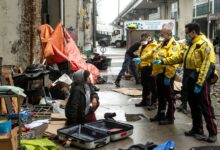Kosovo refugees reflect on how Canada shaped their lives
It has been 20 years since more than 2,500 refugees from Kosovo set foot in Nova Scotia, fleeing brutal warfare in their homeland in the Balkans region of Europe.
Between May and August of 1999, as many as 300 Kosovar Albanian refugees arrived each day in the province, part of a massive Canadian airlift from crowded refugee camps in Macedonia.
More than 13,000 people were killed or went missing in the Kosovo War.
Those who survived and made it to refugee camps faced an uncertain future — could they ever return to their home? Or should they leave everything behind to start a new life on another continent as refugees?
Arta Rexhepi was just 13 years old when her family took that risk and landed at CFB Greenwood in Nova Scotia’s Annapolis Valley. She spoke to three other former Kosovo refugees whose lives were defined by that momentous decision 20 years ago.
Kushtrim Vuniqi
Kushtrim Vuniqi was nine when his family arrived in Greenwood 20 years ago. They’ve been living in Halifax ever since.
Nova Scotians haven’t fallen short in showing great acts of kindness, he said.
“I remember when the airplane doors opened I could see a crowd of people waiting with teddy bears and Canadian flags, cheering. I had a warm feeling and happiness, I felt like a child again.”
When the Vuniqis learned that their family home in Kosovo had burned down in the war, they saw Canada as their new glimpse of hope.
“I truly believe Canada is the best place to live in because I have experienced and seen what another life in a Third World country is.”
Vuniqi is an entrepreneur, operating his own barbershop. He brings something different to the table, mixing urban and professional styles.
“I look at barbering as an art form. It comes naturally. The head is is my canvas and the clippers are my paint brush.”
He had a tough road getting started. Being refugees, his family had to start a new life in Canada from scratch.
“I started off by cutting my friends’ hair for free in my garage and also had an adapter that would plug into my car and I would cut hair for my friends after playing basketball out in the parking lot.”
Vuniqi is just one of 85 refugees from Kosovo who remain in the province, according to Statistics Canada.
The Albanian Canadian Community Association of Nova Scotia says that close to 200 refugees settled here, but that number has dropped significantly.
Some Kosovo refugees struggled with language barriers. Some dealt with employment issues caused by difficulties having credentials recognized by Canadian institutions.
Many moved to Ontario for better opportunities, or to feel closer to other refugees.
However, the community is now growing due to the influx of new immigrants.
Xhemajl Rexha
Xhemajl Rexha was 13 when his family of six arrived in Nova Scotia.
He remembers evacuating his home at gunpoint in Kosovo and heading to overcrowded refugee camps in Macedonia.
After his family arrived in Canada, they spent time in Edmonton and at Camp Aldershot in the Annapolis Valley.
But Canada didn’t feel like home for the family. They had suffered casualties in the war. Rexha’s mother couldn’t bear the distance.
“We are sure that we would have better opportunities for our studies. We don’t, however, regret our decision to return. As cliché as it is, there is nothing like home.”
Rexha is now a celebrity journalist in Kosovo, a current affairs producer/host and editor-in-chief for national television KTV. But he wishes his family stayed long enough in Canada to gain citizenship.
“We will always be grateful for what this great country did for so many of us. I do regret not staying enough to get the citizenship.”
He said Kosovo was both liberating and devastating upon their return.
“I remember people singing and dancing in Pristina’s main square every night, for a couple of weeks. [They were] celebrating freedom. But soon it would turn grim.
“So many damages where done all around and it was hard for people to start building their lives again. Thousands of people were still missing.”
Kosovo has claimed independence from Serbia since 2008. Canada is one of more than 100 nations to recognize that claim.
Rexha hopes they will soon be able to mend the past “with them [Serbia] recognizing our independence so we can finally leave the conflict behind.”
Elbonita Kozhani
Elbonita Kozhani was one of the young refugee children who arrived in Greenwood.
Canada may have been bittersweet for Kozhani who, a few years later after settling in Halifax, would lose her mother to a fatal fall.
“When life throws you one of the biggest heartbreaks, you can either be bitter or be better,” she said.
While Kozhani’s family resides in Halifax, she moved to New Brunswick for work. She is a registered nurse in Moncton.
The 28-year-old is also a photographer who has travelled to more than 60 countries, capturing captivating stories worldwide.
She strives to give back to others and devotes time to new Syrian refugees. She said she can relate to their experience.
“I often wish refugee families who know the hurt and fears of having to leave their home and families behind would put more effort into sponsoring/volunteering with current refugee families, as these individuals are able to connect with them in a totally different level.” she said.
As for Kozhani, she doesn’t feel remorse, but does wonder what life would’ve offered for her in Kosovo if she had been able to stay.
“Life is good. However, I will always wonder what life would have been like had we not moved here or had returned back to Kosovo — a lot of what ifs.”








Redes Sociais - Comentários